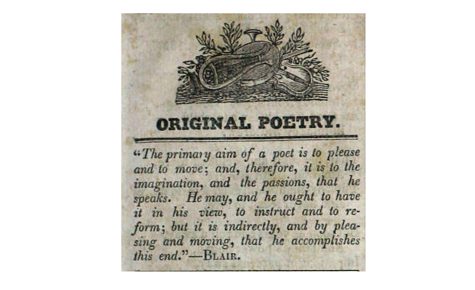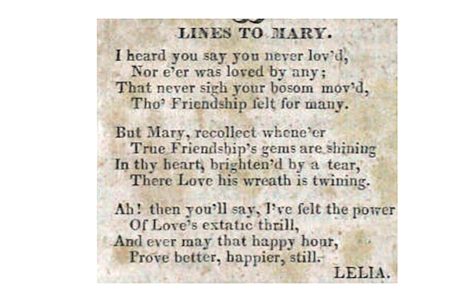Miami libraries develop poetry exhibit to open March 2023
May 13, 2022
The recent spring editions of Miami University’s student-run literary magazines — ”Happy Captive Magazine” and “Inklings Arts & Letters” — continue an Oxford tradition that can be traced to the early nineteenth century.
Miami’s libraries are in the first stages of developing an exhibit on student and faculty poetry. This exhibit, which is tentatively planned to open in March of 2023, will feature work from the university’s earliest years.
Among the library’s archives are poems that were featured in numerous volumes of “The Literary Register,” and “The Literary Focus,” student newspapers edited by faculty in the summers of 1827 and 1828 respectively. In the first volume of “The Register,” a collection of student lyric poems can be found just a handful of pages after a news brief about Emperor Nicholas I of Russia.

“The Register’s” first issue, which advertises a year-long subscription for $2, was released in a transitory period that saw the rationalism of the American Enlightenment being overtaken by the intense emotions and individuality of the Romantic Period.
In analyzing their aesthetics and themes, student work from both “The Focus” and “The Register” can be placed in the context of the Romantic Period, which had been underway for decades in Europe before emerging in the United States. In the aftermath of the American Revolution, the Romantic Period saw the country beginning to form its own artistic identity that emphasized personal expression, imagination and emotion.

Littered among stanzas of passionate young love, the student works make repeated references to melancholy, social rejection, regret and grief. These motifs would go on decades later to become characteristic of Baltimore poet Edgar Allan Poe, perhaps the most recognizable name to come from America’s Romantic Period.
A vast number of the volumes’ works also follow the same verse and metrical structure. Each of the poem’s stanzas consist of four lines that follow an ABAB rhyme scheme, meaning the third line of a stanza rhymes with the first, and the fourth line rhymes with the second.
It is clear that Oxford students at the time were drawing influence from their contemporaries. Nearly 200 years later, the evolution of the medium means that students eager to submit original poetry have a much larger formal and aesthetic pool to draw from.
According to Sophia Balsamo, a junior English literature student and staff member at “Inklings,” one of the primary missions of that organization is to help students navigate effective approaches to poetry by rewarding experimentation.
“Students need opportunities to hone their work, places to submit. And often, professional literary magazines just aren’t within reach for those students,” Balsamo said. “So, student publications become an opportunity for the student body to explore writing in a low-stakes way where they have a greater chance of being accepted.”
Every semester, Balsamo and the rest of the “Inklings” staff meet to evaluate and filter through dozens of writing and visual art submissions. She emphasized that the common thread behind successful submissions is that they feel unique and “true to an individual person’s voice.”
Where the themes and formal techniques of Miami’s earliest poetry publications generally coincide, “Inklings” co-editors-in-chief Elizabeth Brueggemann and Rhonda Krehbiel introduced their Spring 2022 issue with a confession that they were “having trouble pinning down the spirit of this issue.”
“There’s too much to fit into a pithy thematic description,” they wrote in the first pages of their latest publication. “These pages tackle the complicated breadth of the college experience in dizzying leaps between the existential and the everyday.”
In a brief note preceding its final few pages, the first volume of “The Register,” back in 1827, boldly reiterated its mission of relying on student writing to communicate the state of the world and making important information accessible to a broad audience.
“Whether our plan, to make some portion of Literature and Science accessible to all classes, and thus to cultivate a taste for higher pursuits than the noise and buffetings of party warfare, will be successful, is enveloped in the unknown future,” the note said.
Two centuries later, student writers in “Inklings” and “Happy Captive” utilize poetic devices to communicate complex ideas to a broad audience. To Balsamo, such a large passage of time is not a variable that could change the intrinsic desire for people to express themselves to others in such a way.
“Writing and art are natural parts of humanity, something we cannot help but participate in, and being a conduit for that is really rewarding,” Balsamo said.













